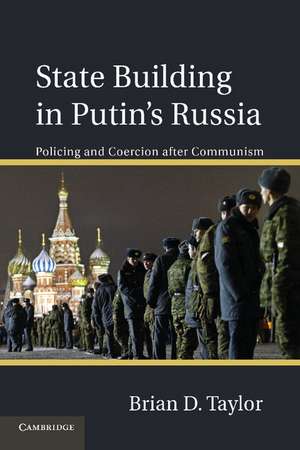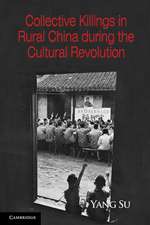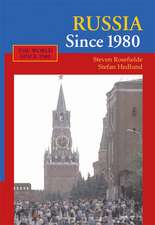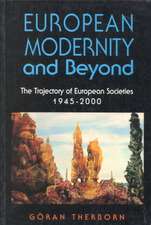State Building in Putin’s Russia: Policing and Coercion after Communism
Autor Brian D. Tayloren Limba Engleză Paperback – 21 aug 2013
| Toate formatele și edițiile | Preț | Express |
|---|---|---|
| Paperback (1) | 325.38 lei 6-8 săpt. | |
| Cambridge University Press – 21 aug 2013 | 325.38 lei 6-8 săpt. | |
| Hardback (1) | 818.51 lei 6-8 săpt. | |
| Cambridge University Press – 20 feb 2011 | 818.51 lei 6-8 săpt. |
Preț: 325.38 lei
Nou
Puncte Express: 488
Preț estimativ în valută:
62.28€ • 67.67$ • 52.35£
62.28€ • 67.67$ • 52.35£
Carte tipărită la comandă
Livrare economică 21 aprilie-05 mai
Preluare comenzi: 021 569.72.76
Specificații
ISBN-13: 9781107618046
ISBN-10: 1107618045
Pagini: 392
Ilustrații: 34 b/w illus. 2 maps 15 tables
Dimensiuni: 156 x 234 x 22 mm
Greutate: 0.6 kg
Editura: Cambridge University Press
Colecția Cambridge University Press
Locul publicării:New York, United States
ISBN-10: 1107618045
Pagini: 392
Ilustrații: 34 b/w illus. 2 maps 15 tables
Dimensiuni: 156 x 234 x 22 mm
Greutate: 0.6 kg
Editura: Cambridge University Press
Colecția Cambridge University Press
Locul publicării:New York, United States
Cuprins
1. Bringing the gun back in: coercion and the state; 2. The power ministries and the siloviki; 3. Coercion and capacity: political order and the central state; 4. Coercion and capacity: centralization and federalism; 5. Coercion and quality: power ministry practices and personnel; 6. Coercion and quality: the state and society; 7. Coercion in the North Caucasus; 8. State capacity and quality reconsidered.
Recenzii
“A lot of scholars write about the coercive capacity of the state, but very few have taken on the onerous tasks of identifying the dimensions of state capacity and evaluating the quality of the state-building project. In this important study of the power ministries in Russia since the early 1990s, Brian D. Taylor fills in these gaping holes in our understanding of what state capacity actually means—in theory and on the ground. He concludes that, Putin’s boasts to the contrary, Russian state performance is quite mixed, especially regarding the state’s ability to provide order, enforce property rights, establish rule of law, and build a civic-minded professional bureaucracy that inspires public confidence.”
—Valerie Bunce, Cornell University
“This book will be the definitive work on the coercive agents of Russian state-building—the police, military, and security services—and the most sustained treatment of the issue of ‘stateness’ in Russia. The author has employed cross-national data to evaluate Russia in comparative perspective and has conducted research in several Russian regions, as well as Moscow, to understand the relationship between coercive power and state development at both the central and local/regional levels. Scholars from Weber through Tilly associate the formation of states with the wielding of coercive power and waging of wars. This study, by contrast, examines a less familiar topic: the author’s linkage of the coercive agents of state power (siloviki) to the development of federalism is rare in the comparative literature. Based on prodigious research, State Building in Putin’s Russia is a highly original contribution.”
—Matthew Evangelista, Cornell University
“The ‘power ministries’ of the police, the security services, and the military have been central to state building efforts in post-Soviet Russia, but have been vastly understudied. Brian Taylor’s fascinating book pries open the power ministries to explore how organizational pathologies, weak oversight, and increasingly authoritarian rule undermined efforts to build state capacity in Russia. Taylor demonstrates that in many respects the state is hardly more effective under Putin than under Yeltsin, despite Russia’s return to economic growth and prominence on the international stage. With its keen attention to detail and impressive data collection, State Building in Putin’s Russia is an important work that should interest Russia-watchers and scholars of state building alike.”
—Timothy Frye, Columbia University
“Brian Taylor has been doing research on Russian siloviki for many years and knows numerous sources, both in Russian and in English, perhaps better than anyone else. His book is based not only on detailed analysis of existing publications but on a large number of interviews. It summarizes extensive existing material and brings important new data to light for understanding both Putin’s Russia and the broader logics and regularities of post-Soviet development. This is very timely contribution on Russia and the results of Putin's presidency, and is also a valuable contribution to a broader discussion on democracy and development.”
—Nikolay Petrov, Carnegie Moscow Center
“Brian Taylor offers a clear-eyed account of Vladimir Putin’s efforts to rebuild the power of the state in Russia in the 2000s. Taylor distinguishes between state capacity and state quality, and finds only modest improvements in state capacity under Putin and none in the degree to which the state actually serves the public interest. Focusing in particular on the coercive agencies of the state—the military, police, and security forces—Taylor shows that under Putin, they were largely ineffective in combating crime and terrorism but were often used for the purposes of political repression and intimidation. Taylor concludes that centralizing and consolidating power at the top is a very different enterprise from improving the quality of governance in a state.”
—Thomas F. Remington, Emory University
"It may be pointless to say that had Vladimir Putin read this book he would have done a better job of building the strong state he desired while serving the broader public good. Yet it is not too much to suggest that readers would be hard-pressed to find a more subtle and lucid account of why his effort to strengthen the state's coercive arm failed to dent corruption, protect property rights, or advance the rule of law. This is by far the most thorough and systematic study of Russia's so-called power ministries, charged with administering the state's monopoly over the legitimate use of force."
—Foreign Affairs
—Valerie Bunce, Cornell University
“This book will be the definitive work on the coercive agents of Russian state-building—the police, military, and security services—and the most sustained treatment of the issue of ‘stateness’ in Russia. The author has employed cross-national data to evaluate Russia in comparative perspective and has conducted research in several Russian regions, as well as Moscow, to understand the relationship between coercive power and state development at both the central and local/regional levels. Scholars from Weber through Tilly associate the formation of states with the wielding of coercive power and waging of wars. This study, by contrast, examines a less familiar topic: the author’s linkage of the coercive agents of state power (siloviki) to the development of federalism is rare in the comparative literature. Based on prodigious research, State Building in Putin’s Russia is a highly original contribution.”
—Matthew Evangelista, Cornell University
“The ‘power ministries’ of the police, the security services, and the military have been central to state building efforts in post-Soviet Russia, but have been vastly understudied. Brian Taylor’s fascinating book pries open the power ministries to explore how organizational pathologies, weak oversight, and increasingly authoritarian rule undermined efforts to build state capacity in Russia. Taylor demonstrates that in many respects the state is hardly more effective under Putin than under Yeltsin, despite Russia’s return to economic growth and prominence on the international stage. With its keen attention to detail and impressive data collection, State Building in Putin’s Russia is an important work that should interest Russia-watchers and scholars of state building alike.”
—Timothy Frye, Columbia University
“Brian Taylor has been doing research on Russian siloviki for many years and knows numerous sources, both in Russian and in English, perhaps better than anyone else. His book is based not only on detailed analysis of existing publications but on a large number of interviews. It summarizes extensive existing material and brings important new data to light for understanding both Putin’s Russia and the broader logics and regularities of post-Soviet development. This is very timely contribution on Russia and the results of Putin's presidency, and is also a valuable contribution to a broader discussion on democracy and development.”
—Nikolay Petrov, Carnegie Moscow Center
“Brian Taylor offers a clear-eyed account of Vladimir Putin’s efforts to rebuild the power of the state in Russia in the 2000s. Taylor distinguishes between state capacity and state quality, and finds only modest improvements in state capacity under Putin and none in the degree to which the state actually serves the public interest. Focusing in particular on the coercive agencies of the state—the military, police, and security forces—Taylor shows that under Putin, they were largely ineffective in combating crime and terrorism but were often used for the purposes of political repression and intimidation. Taylor concludes that centralizing and consolidating power at the top is a very different enterprise from improving the quality of governance in a state.”
—Thomas F. Remington, Emory University
"It may be pointless to say that had Vladimir Putin read this book he would have done a better job of building the strong state he desired while serving the broader public good. Yet it is not too much to suggest that readers would be hard-pressed to find a more subtle and lucid account of why his effort to strengthen the state's coercive arm failed to dent corruption, protect property rights, or advance the rule of law. This is by far the most thorough and systematic study of Russia's so-called power ministries, charged with administering the state's monopoly over the legitimate use of force."
—Foreign Affairs
Notă biografică
Descriere
This book argues that Vladimir Putin's strategy for rebuilding the Russian state was fundamentally flawed.
















